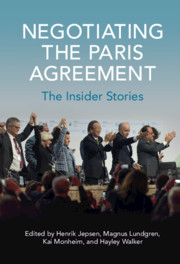Book contents
- Negotiating the Paris Agreement
- Negotiating the Paris Agreement
- Copyright page
- Contents
- Figure
- Editors
- Contributors
- Acknowledgments
- Foreword
- 1 Introduction
- 2 The Paris Negotiations: Background and Context
- 3 The French COP 21 Presidency
- 4 Mission: Adoption with Ovations: The Contribution of the UNFCCC Secretariat to the Achievement of the Paris Agreement
- 5 The Paris Agreement and China’s Imprint
- 6 The EU’s Role in the Paris Agreement
- 7 The United States: Interesting Processes and Techniques Lined the Road to Paris
- 8 COP 21 – Complaints and Negotiation: The Role of the Like-Minded Developing Countries Group (LMDC) and the Paris Agreement
- 9 The Staircase of Paris
- 10 The Battle for Small Island Developing States
- 11 The High Ambition Coalition
- 12 The Power of Civil Society
- 13 Business: Creating the Context
- 14 Why Did They Finally Reach Agreement?
- 15 Conclusion: The Landscape of Multilateral Agreement in Paris and Beyond
- Afterword
- Appendix: The Paris Agreement
- References
- Index
8 - COP 21 – Complaints and Negotiation: The Role of the Like-Minded Developing Countries Group (LMDC) and the Paris Agreement
Published online by Cambridge University Press: 24 September 2021
- Negotiating the Paris Agreement
- Negotiating the Paris Agreement
- Copyright page
- Contents
- Figure
- Editors
- Contributors
- Acknowledgments
- Foreword
- 1 Introduction
- 2 The Paris Negotiations: Background and Context
- 3 The French COP 21 Presidency
- 4 Mission: Adoption with Ovations: The Contribution of the UNFCCC Secretariat to the Achievement of the Paris Agreement
- 5 The Paris Agreement and China’s Imprint
- 6 The EU’s Role in the Paris Agreement
- 7 The United States: Interesting Processes and Techniques Lined the Road to Paris
- 8 COP 21 – Complaints and Negotiation: The Role of the Like-Minded Developing Countries Group (LMDC) and the Paris Agreement
- 9 The Staircase of Paris
- 10 The Battle for Small Island Developing States
- 11 The High Ambition Coalition
- 12 The Power of Civil Society
- 13 Business: Creating the Context
- 14 Why Did They Finally Reach Agreement?
- 15 Conclusion: The Landscape of Multilateral Agreement in Paris and Beyond
- Afterword
- Appendix: The Paris Agreement
- References
- Index
Summary
Former Bolivian Minister of Development Planning Rene Orellana Halkyer provides the perspective of the Like-Minded Developing Countries (LMDC), one of the most influential groups of developing-country parties in the Paris Agreement negotiations including powerful voices such as China, India, and Saudi Arabia. The chapter details the group’s ideology, key demands, and dynamics. Like a Russian doll, the group incorporates various national and sub-group positions, nested within the G77+China. Less powerful developing countries that may otherwise have had little influence were able to use the LMDC’s political clout to amplify their demands and achieve gains in the text. Orellana recount the “battles of wording” in which the mark of the LMDC can be seen in the outcome of COP 21 and reflects on the importance of normative discourse for a group that sees itself as “the representative of the voices that call for a more equitable world”. His account includes fascinating examples of how the practice of “making a wave” in plenary combines power politics and external events with mastery of the negotiation process through the medium of normative discourse to shift negotiation outcomes.
- Type
- Chapter
- Information
- Negotiating the Paris AgreementThe Insider Stories, pp. 160 - 181Publisher: Cambridge University PressPrint publication year: 2021

